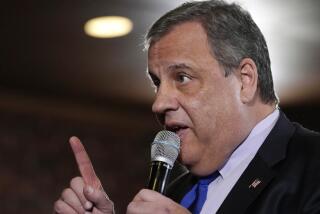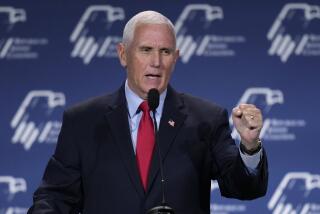Perot Quit Over Costs, Scrutiny, Rollins Says : Politics: Ex-aide also charges that the Texas billionaire lacks the temperament to be President.
- Share via
DALLAS — Ross Perot dropped out of the presidential race because he abhorred the intense press scrutiny, was unwilling to spend the money required to win and lacked the temperament either to run a successful race or to govern, according to Edward J. Rollins, his former campaign co-chairman.
Rollins’ stark depiction Sunday of the collapse of Perot’s independent candidacy directly contradicts the statements that the Texas billionaire has made in explaining his sudden withdrawal from the presidential contest last Thursday.
Perot has said that he quit because the revitalization of the Democratic Party meant that he could not win the election outright and that he did not want to be a divisive force in American politics.
He has also said that his proposed plan for righting the domestic economy would be such bitter medicine that it would doom his candidacy.
Rollins said Perot’s efforts to keep alive the volunteer movement that put him on 24 state ballots represents a “half-try” to appease his bitter and disappointed supporters and predicted that the nationwide political coalition his backers are now trying to create will fail.
“I think he’ll play with them for a while, but I really don’t think he’ll get back in the race,” Rollins said in an appearance on ABC-TV’s “This Week With David Brinkley.”
Perot’s campaign director and longtime friend, Tom Luce, said in a telephone interview Sunday that Rollins was trying to “rewrite history” to salvage his reputation as a political genius. Luce said that reputation has been tarnished by Rollins’ thorough mishandling of the Perot campaign.
Perot says he has spent $10 million so far in his abortive run for the White House and would be willing to spend as much as $100 million for the entire campaign. But Rollins said that Perot bridled at the advertising budget he proposed--$50 million for television and direct-mail ads to counter the expected barrage of Democratic and Republican campaign publicity.
Rollins said Perot rejected his advice to mount an aggressive advertising campaign to define himself in his own terms and to reverse a steep slide in the polls. Instead, Rollins said, “he spent a tremendous amount of money on grass-roots activities that may, in the final analysis, not matter to the general electorate. He had great difficulty moving from retail politics to wholesale politics, and I think that is really where the system broke down.”
Other Perot campaign officials said Perot believed that political advertising was by its nature deceptive and a waste of money. He told aides there was no point spending millions of dollars on television spots when he got all the free time he wanted from television’s Larry King and Barbara Walters and from the network morning shows.
Rollins also said Perot was surprised and dismayed at the intensity of the critical attention he and his family received during his brief career in elective politics. Perot was the subject of hundreds of critical newspaper stories delving into his business dealings, his negotiations with the Vietnamese over supposed U.S. servicemen missing from the Vietnam War, his charitable activities and his penchant for hiring private investigators to spy on business and political enemies.
The Bush Administration characterized him as a “temperamental tycoon” with “contempt for the Constitution.” White House spokesman Marlin Fitzwater called him a “monster” from the podium of the White House briefing room. “Inspector Perot,” the super-snoop, became a common caricature in the nation’s media.
“He didn’t like the scrutiny,” Rollins said. “He obviously had some very tough decisions to make, and I think he just realized it was going to be a very, very tough, long campaign, as is every presidential campaign.”
Luce said in the telephone interview that he was angered by Rollins’ efforts to put his own spin on events he did not control and never really understood.
“Ed never got involved in the campaign with the volunteers, and that was really the essence of this campaign,” Luce said.
Rollins’ comments and Luce’s response revealed a deep schism within the Perot organization that opened at virtually the same time Rollins and Democratic political adviser Hamilton Jordan joined the effort in early June.
Luce said there was “tension and conflict” from the beginning between Perot and the corps of political professionals he hired to advise him.
“It should be obvious that Mr. Rollins’ views were never accepted by Mr. Perot,” Luce said. “I specifically discussed numerous times with Mr. Rollins before he was hired that he was coming into a campaign where the candidate would not be handled nor would he take 3-by-5 cards” telling him what to say, Luce added.
He said Perot knew exactly what he was getting into when he launched his independent presidential bid and was not at all reluctant to spend the money needed to run. “He just wasn’t spending the money where Mr. Rollins wanted him to,” Luce said.
Luce could barely disguise his fury at Rollins, saying that his efforts to blame Perot for his own failures represented “politics at its worst.”
Luce agreed that Perot rejected Rollins’ advertising plan but gave a different reason. “We had serious and substantive differences that had nothing to do with money but how it should be spent and how the campaign should be run. We felt strongly that this should not be a rerun of ‘Morning in America,’ ” Luce said.
He was referring to the ad campaign that Rollins and San Francisco adman Hal Riney put together for Ronald Reagan’s successful 1984 reelection campaign. Rollins brought Riney into the Perot camp to create image-making ads but, after one look at his proposed spots, Perot fired him.
Rollins said that Democratic nominee Bill Clinton would be the immediate beneficiary of Perot’s departure because he will be seen as the only remaining candidate for change. But--in an obvious attempt to mend fences with the Republican Party, which he bolted to work for Perot--Rollins added that he would vote for Bush and expects the President to win back many of the disaffected Republicans who supported Perot.
In a parting shot, Rollins said that in the 45 days he worked for Perot, he came to believe that the industrialist’s “temperament was probably not quite right to be the President of the United States.”
Luce retorted: “There is obviously a temperamental difference between Ronald Reagan and Ross Perot. He is not quite as manageable. He is not able to be scripted.”
As the Dallas billionaire’s top aides traded recriminations, Perot met for a second day with leaders of the volunteer movement to discuss how they could remain involved in national politics.
About 40 volunteers from around the country urged Perot to reconsider his decision to quit the presidential quest, but Perot would not be swayed. He will, however, allow them to continue efforts to place his name on all 50 general election ballots and will provide financial support to a coalition to keep his agenda before the public.
Paul Fisher, volunteer coordinator for Nevada, said Perot told the group that he would continue his efforts to address the nation’s ills.
“He is not afraid. He is not backing out because he was threatened,” Fisher said, addressing recurring rumors that Perot quit because of threats on his life or because the Republican Party had some damaging information about him. “He realizes that even if he were elected President, that would not solve the problems.”
He said that every volunteer in the room had a different idea about how to structure the movement and what role to play in local, state and national politics. The group did not agree on a name for their coalition; some believed it should not even be formally organized.
“We don’t want this to be a private organization or a cult,” Fisher said. “We want this to be an organization for all Americans.”
More to Read
Get the L.A. Times Politics newsletter
Deeply reported insights into legislation, politics and policy from Sacramento, Washington and beyond. In your inbox twice per week.
You may occasionally receive promotional content from the Los Angeles Times.










